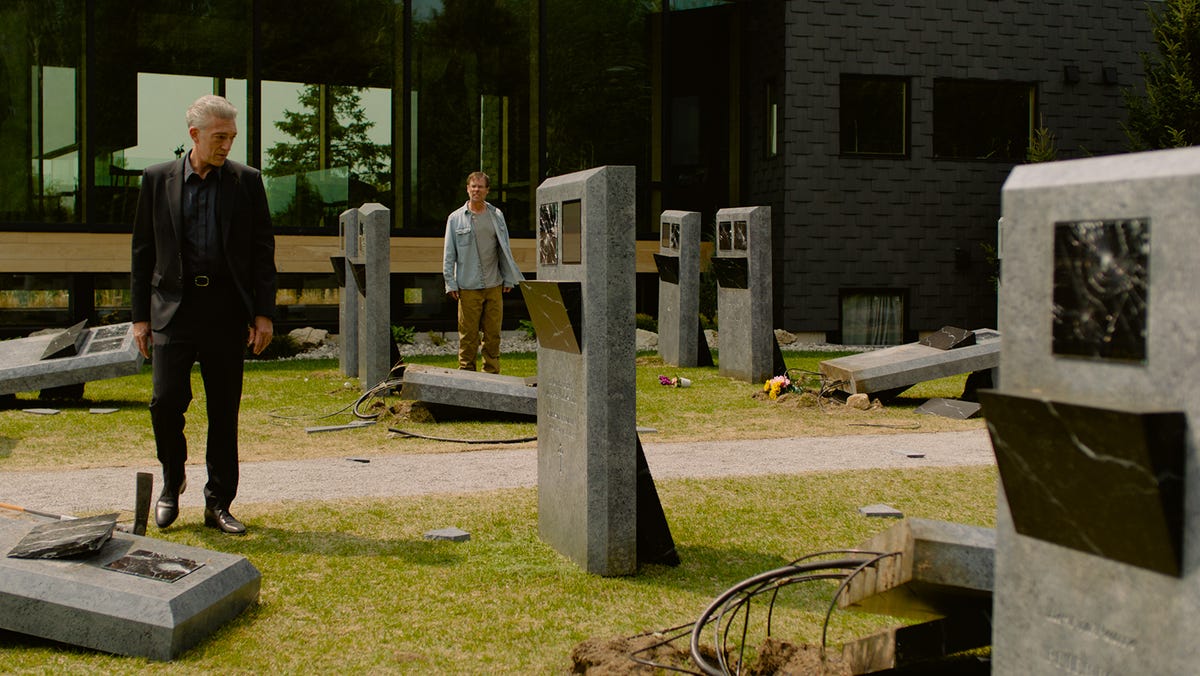A man clings to his dead wife in David Cronenberg’s ‘The Shrouds’
Vincent Cassel and Diane Kruger star in David Cronenberg’s “The Shrouds,” following a husband haunted by the memory of his late wife.
David Cronenberg knows exactly how he wants to be buried.
In his new movie “The Shrouds” (in theaters nationwide April 25), the Canadian filmmaker imagines a near future where high-definition cameras are placed in luxury coffins, allowing people to check in on their loved ones via livestream after they die.
It may sound macabre, watching your family and friends as their bodies gradually decay through the years. But if such technology actually existed, Cronenberg would be all in.
“I would have done that, I really would,” he says on a Zoom call. “In Toronto, we have a walk of fame with plaques in the sidewalk. I thought, ‘I would like to be buried under my plaque.’ In fact, it should have Plexiglass so people could look down and see me there disintegrating. I know my fans would love that.”
‘The Shrouds’ movie tells a ‘very personal’ story about grief
“The Shrouds” follows an anguished entrepreneur named Karsh (Vincent Cassel), who starts a casket surveillance company known as GraveTech following the death of his wife, Becca (Diane Kruger). But after her cemetery plot is vandalized one night, along with many others, Karsh sets out to catch the culprits and uncover the secrets of Becca’s past.
The film is extremely meaningful to Cronenberg, 82, the body-horror maestro behind “Scanners,” “Videodrome” and “The Fly.” In 2017, he lost his frequent collaborator and wife of 38 years, Carolyn Zeifman, to cancer. She was 66.
“I made a lot of notes throughout the two years I was taking care of my wife,” Cronenberg says. Writing this movie, “I just had to remind myself what I was thinking and feeling.”
In an early scene, Karsh explains to a blind date (Jennifer Dale) why he invented GraveTech. Watching as Becca was lowered into the ground, he felt an intense urge to hop in there with her. (“I couldn’t stand it that she was alone in there, and that I would never know what was happening to her,” Karsh says.)
That sentiment is drawn from Cronenberg’s own grieving experience.
“I might not have jumped, but I would have been in there,” Cronenberg says. “Those were feelings that really surprised me; I didn’t anticipate them, but they hit me very hard. Without really being conscious of it, I always thought I was her protector. When she died, I realized how vulnerable I was to the world and that she had been protecting me all that time.”
Kruger plays three characters in the movie, including Becca’s consoling twin sister, Terry, and Karsh’s A.I. assistant bot, Hunny.
Reading the script, “there seemed to be this enduring love story in the film that was very emotional and touched me profoundly,” the German actress says. Meeting him afterward, “David was very generous in sharing a lot of stories and inspirations for these characters. It made it very personal.”
“Shrouds” helped Kruger to understand the physical torment of losing your soulmate. She wonders how it must have felt for her grandfather, who was married to her grandmother for 70 years before she died.
“The pain of continuing to exist, and not having her body, has new meaning to me,” Kruger, 48, says. “It’s uncomfortable and sad to think about death: the fear of really being gone and not seeing that person again. It’s not something I particularly look forward to.”
‘Shrouds’ director David Cronenberg reflects on his own mortality, legacy
Cronenberg, who is atheist, has long-explored mortality and the unhappy realities of the human body, most recently in his 2022 sci-fi drama “Crimes of the Future.”
British writer Christopher Hitchens once said that “death causes religion,” and “I think that’s the truth,” Cronenberg says. “People can’t face it. It’s very powerful for us to imagine not existing, and so to avoid imagining our own oblivion, we make up stories that say you will not really disappear; that you’ll be in heaven or get reincarnated.”
But ultimately, life is about “accepting the beauty and absurdity of existence. It’s that very beauty that makes it so painful to imagine leaving it.”
Cronenberg has worked steadily for six decades, directing Oscar-nominated films such as “Eastern Promises” and “A History of Violence,” although he himself has never been nominated. The unassuming filmmaker downplays his Hollywood impact, but speaks highly of horror provocateurs Coralie Fargeat (“The Substance”) and Julia Ducournau (“Titane”), both of whom have cited him as a major influence.
“They’re really talented and it’s very sweet. They’re like my cinematic daughters,” Cronenberg says. “The fact that I’ve inspired younger filmmakers is lovely, but it doesn’t pay the bills.”
He also has little patience for directors like Quentin Tarantino, who has proclaimed for years that he plans to retire after his 10th and final movie, as a career “mic drop.”
“Who cares? The people who like his films won’t remember which order they were in,” Cronenberg says with a shrug. “Frankly, you’re kidding yourself if you think you’re in control of your legacy. You aren’t.”

Leave a Reply